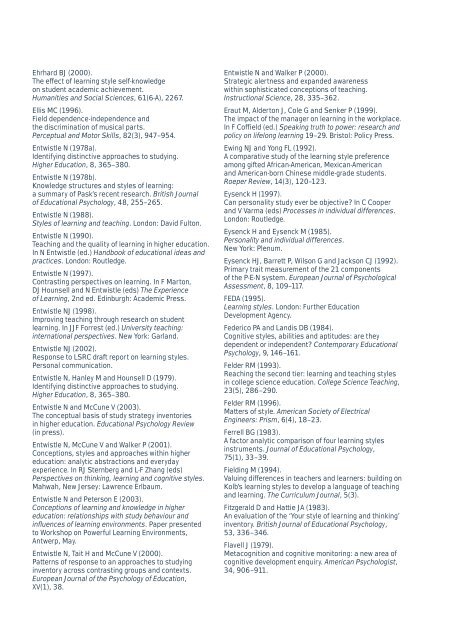learning-styles
learning-styles
learning-styles
Create successful ePaper yourself
Turn your PDF publications into a flip-book with our unique Google optimized e-Paper software.
Ehrhard BJ (2000).<br />
The effect of <strong>learning</strong> style self-knowledge<br />
on student academic achievement.<br />
Humanities and Social Sciences, 61(6-A), 2267.<br />
Ellis MC (1996).<br />
Field dependence-independence and<br />
the discrimination of musical parts.<br />
Perceptual and Motor Skills, 82(3), 947–954.<br />
Entwistle N (1978a).<br />
Identifying distinctive approaches to studying.<br />
Higher Education, 8, 365–380.<br />
Entwistle N (1978b).<br />
Knowledge structures and <strong>styles</strong> of <strong>learning</strong>:<br />
a summary of Pask’s recent research. British Journal<br />
of Educational Psychology, 48, 255–265.<br />
Entwistle N (1988).<br />
Styles of <strong>learning</strong> and teaching. London: David Fulton.<br />
Entwistle N (1990).<br />
Teaching and the quality of <strong>learning</strong> in higher education.<br />
In N Entwistle (ed.) Handbook of educational ideas and<br />
practices. London: Routledge.<br />
Entwistle N (1997).<br />
Contrasting perspectives on <strong>learning</strong>. In F Marton,<br />
DJ Hounsell and N Entwistle (eds) The Experience<br />
of Learning, 2nd ed. Edinburgh: Academic Press.<br />
Entwistle NJ (1998).<br />
Improving teaching through research on student<br />
<strong>learning</strong>. In JJF Forrest (ed.) University teaching:<br />
international perspectives. New York: Garland.<br />
Entwistle NJ (2002).<br />
Response to LSRC draft report on <strong>learning</strong> <strong>styles</strong>.<br />
Personal communication.<br />
Entwistle N, Hanley M and Hounsell D (1979).<br />
Identifying distinctive approaches to studying.<br />
Higher Education, 8, 365–380.<br />
Entwistle N and McCune V (2003).<br />
The conceptual basis of study strategy inventories<br />
in higher education. Educational Psychology Review<br />
(in press).<br />
Entwistle N, McCune V and Walker P (2001).<br />
Conceptions, <strong>styles</strong> and approaches within higher<br />
education: analytic abstractions and everyday<br />
experience. In RJ Sternberg and L-F Zhang (eds)<br />
Perspectives on thinking, <strong>learning</strong> and cognitive <strong>styles</strong>.<br />
Mahwah, New Jersey: Lawrence Erlbaum.<br />
Entwistle N and Peterson E (2003).<br />
Conceptions of <strong>learning</strong> and knowledge in higher<br />
education: relationships with study behaviour and<br />
influences of <strong>learning</strong> environments. Paper presented<br />
to Workshop on Powerful Learning Environments,<br />
Antwerp, May.<br />
Entwistle N, Tait H and McCune V (2000).<br />
Patterns of response to an approaches to studying<br />
inventory across contrasting groups and contexts.<br />
European Journal of the Psychology of Education,<br />
XV(1), 38.<br />
Entwistle N and Walker P (2000).<br />
Strategic alertness and expanded awareness<br />
within sophisticated conceptions of teaching.<br />
Instructional Science, 28, 335–362.<br />
Eraut M, Alderton J, Cole G and Senker P (1999).<br />
The impact of the manager on <strong>learning</strong> in the workplace.<br />
In F Coffield (ed.) Speaking truth to power: research and<br />
policy on lifelong <strong>learning</strong> 19–29. Bristol: Policy Press.<br />
Ewing NJ and Yong FL (1992).<br />
A comparative study of the <strong>learning</strong> style preference<br />
among gifted African-American, Mexican-American<br />
and American-born Chinese middle-grade students.<br />
Roeper Review, 14(3), 120–123.<br />
Eysenck H (1997).<br />
Can personality study ever be objective? In C Cooper<br />
and V Varma (eds) Processes in individual differences.<br />
London: Routledge.<br />
Eysenck H and Eysenck M (1985).<br />
Personality and individual differences.<br />
New York: Plenum.<br />
Eysenck HJ, Barrett P, Wilson G and Jackson CJ (1992).<br />
Primary trait measurement of the 21 components<br />
of the P-E-N system. European Journal of Psychological<br />
Assessment, 8, 109–117.<br />
FEDA (1995).<br />
Learning <strong>styles</strong>. London: Further Education<br />
Development Agency.<br />
Federico PA and Landis DB (1984).<br />
Cognitive <strong>styles</strong>, abilities and aptitudes: are they<br />
dependent or independent? Contemporary Educational<br />
Psychology, 9, 146–161.<br />
Felder RM (1993).<br />
Reaching the second tier: <strong>learning</strong> and teaching <strong>styles</strong><br />
in college science education. College Science Teaching,<br />
23(5), 286–290.<br />
Felder RM (1996).<br />
Matters of style. American Society of Electrical<br />
Engineers: Prism, 6(4), 18–23.<br />
Ferrell BG (1983).<br />
A factor analytic comparison of four <strong>learning</strong> <strong>styles</strong><br />
instruments. Journal of Educational Psychology,<br />
75(1), 33–39.<br />
Fielding M (1994).<br />
Valuing differences in teachers and learners: building on<br />
Kolb’s <strong>learning</strong> <strong>styles</strong> to develop a language of teaching<br />
and <strong>learning</strong>. The Curriculum Journal, 5(3).<br />
Fitzgerald D and Hattie JA (1983).<br />
An evaluation of the ‘Your style of <strong>learning</strong> and thinking’<br />
inventory. British Journal of Educational Psychology,<br />
53, 336–346.<br />
Flavell J (1979).<br />
Metacognition and cognitive monitoring: a new area of<br />
cognitive development enquiry. American Psychologist,<br />
34, 906–911.


